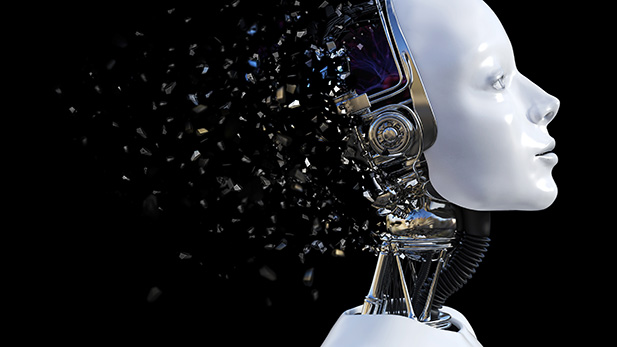“We have to learn how to use AI to our advantage instead of our downfall”

Photo: Shutterstock
We are constantly told by the media that artificial intelligence is going to change our existence. But how?
In a new study, Rony Medaglia, Associate Professor at the Department of Digitalization, is contributing to the discussion with his knowledge of AI in the public sector.
He advocates that we create awareness of AI and focus on how we can make technology work to our advantage instead of our downfall:
“Instead of only talking about AI replacing jobs and decision-making in general, we should talk about how it can support us as human beings. AI should always serve a purpose in society,” says Rony Medaglia.
The risks of AI
Some aspects of artificial intelligence are still highly problematic. Three areas stand out in this regard, explains Rony Medaglia:
- Bias: The data you put in an algorithm can be biased against certain groups of people in society. “There is a case in the US where algorithms should decide whether or not to release inmates from prison and put them in house arrest. Researchers discovered that the decisions were based on data biased against African American inmates, so these algorithms have the potential to be unjust – exactly like people,” Medaglia explains.
- Transparency: “AI algorithms are often so complex that not even the experts who designed them can fully explain the decisions they make. This also affects citizens who have no idea that many aspects of their daily lives are influenced by decisions made with AI technology. AI is still somewhat a black box. This can lead to distrust and social insecurity,” states Rony Medaglia.
- Democracy: When social media algorithms are used to feed us content based on our existing beliefs instead of challenging them, we can get stuck in a kind of echo chamber. “Content on social media is based on user preferences. This is convenient for the user but not for democracy. Instead of talking to people with different views, we only interact with people in our own filter bubbles. This creates a large divide between people in society,” says Medaglia.
The benefits of AI
Even though AI is problematic because of the way it shapes society and can lead to more division, bias and a lack of transparency, AI also has great possibilities and advantages, explains Medaglia.
- AI can relieve public servants of repetitive tasks: “For example deciding whether to accept or reject an application for child support, building permits or other assessments based on very specific criteria. In these cases, algorithms can be more efficient than humans,” says Rony Medaglia.
- AI can support public services: “AI algorithms can, for example, be used to identify hygiene problems at restaurants just by tracking customer reviews on social media. In this way, algorithms can notify public authorities of specific restaurants with bad reviews. As a result, less staff is needed, and we are more likely to find the places with hygiene issues,” he elaborates.
- AI can improve public healthcare: “AI algorithms can recommend personalised treatments to patients by extracting clinical information from the thousands of new scientific medical articles published every day. This is a task no human doctor could carry out when, for instance, deciding on a treatment for a cancer patient. In this way, treatments in public healthcare can potentially become more effective,” says Medaglia.
- AI increases trust in governments: “In many countries, people are suspicious of government street-level bureaucrats, such as office service clerks, local policemen or parking guards because they fear they are not being objective or can be influenced by personal bias or even be bribed. In this regard, governments can use AI to make laws on the basis of clear criteria, so no citizen feel wronged by a public servant,” explains Medaglia.
The future with AI: focus on the distinction between creativity and routine work
As AI gains a stronger foothold in society, a lot of things are most likely to change.
According to Rony Medaglia, the widespread fear of losing our jobs to AI is completely justified:
“A lot of manual and intellectual work will be performed by machines in the future. The big distinction will be between routine work and non-routine work. Jobs where you use empathy or creativity will be reserved for humans while routine work will be handled by machines,” he says.
Medaglia believes that bus or taxi drivers, but also lawyers and accountants, are likely to be completely or partially replaced by AI. But even jobs you might think are harder to replace with an algorithm will be affected:
“Some parts of teaching – say, grammar or historical facts – can also be replaced with machines in the future. The same goes for finance- or sports journalists when it comes to reporting movements on the stock market or the scores of a match,” he explains.
However, Rony Medaglia is not predominantly pessimistic about the future:
“In the 90s, we had a biological breakthrough in regard to cloning animals. We thought we would move on to cloning humans within 10 years. But we decided that it was not ethical and therefore we did not do it. Having AI does not mean we have to use it in a bad way. But we should discuss and talk about what kind of future we want, before it’s already here,” he concludes.
For more information please contact journalist Ida Eriksen